Imagine you’re in the middle of a Zoom® meeting or deeply immersed in your favorite song when, suddenly, your MacBook® speakers start crackling. This unexpected noise can disrupt your concentration and the sound quality of any media you’re playing.
Tech care doesn’t have to be complicated. The experts at uBreakiFix® by Asurion are here to handle any tech issues that arise—keeping you connected. Whether it's a software hiccup or a sign of hardware trouble, let's figure out how to get your audio clear and crackle-free again.
How to fix a Mac speaker that’s crackling
Both hardware and software issues can cause audio disruptions like crackling. Here are some steps to fix hardware and software-related sound problems on your MacBook.
1. Clean the dust buildup
Accumulated dust in the speaker grills can distort the sound. After ensuring your MacBook is turned off and unplugged, use a soft brush or canned air to clean the speakers gently.
2. Unplug external devices
Sometimes, the devices connected to your Mac® can interfere with audio playback. Disconnect all of your connected external devices and check if the crackling stops.

You can’t work when your computer doesn’t want to
Get it repaired fast at one of our stores. Just stop in or make an appointment⎯we'll handle the rest.
3. Adjust the audio settings
Adjusting the sound settings on your Mac can help resolve crackling issues by eliminating conflicts or imbalances in volume, balance, and output device preferences. This optimization ensures smoother audio playback tailored to your specific setup.
Click on the Apple menu > System Settings (or System Preferences) > Sound and ensure the correct output device is selected. Play around with the volume and balance controls to see if adjustments help reduce the crackling.
4. Restart your Mac
A quick restart can fix minor software glitches that cause audio problems. To do so, click on the Apple menu and select Restart.
5. Update macOS
Updating the macOS® can resolve audio issues like crackling by installing the latest software patches that often include fixes for known bugs and improved compatibility with audio drivers. This ensures your system runs the most stable and efficient version available.
Click on the Apple menu > System Settings > General > Software Update and install any available updates. If you don't have System Settings in the Apple menu, click System Preferences > Software Update.
6. Adjust the sample rate
The sample rate measures how many times your Mac samples audio per second, impacting sound quality. Issues like crackling often occur when the Mac's sample rate doesn't match your speaker capabilities. Adjusting the sample rate can sync these settings, potentially clearing up audio distortions like crackling to ensure smoother playback.
Use the Search feature (magnifying glass icon in the menu bar or press Command + Space) and type in "Audio MIDI Setup." Then select your output device and try changing the format to a different sample rate, such as 44.1 kHz or 48 kHz.
Still having audio troubles? Check our guide for sound not working on a Mac computer.
If you've tried these steps and still need a little help, we're right around the corner. Schedule a repair at the nearest uBreakiFix® by Asurion store and our certified experts can get your device back up and running as soon as the same day.





